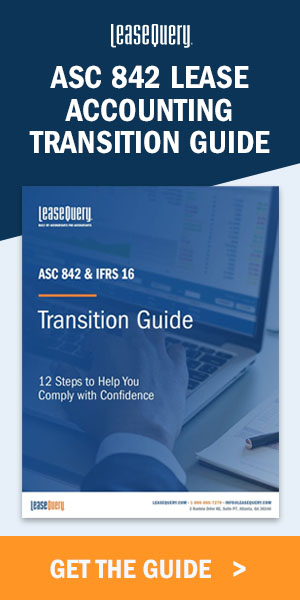This article, "Lease Accounting Implementation Trends in 2021," originally appeared on AccountingWeb.com.
Summary provided by MaterialAccounting.com: The article below explains four major lease accounting standard trends in 2021 and the advice accounting professionals need to share with their clients.
This article focuses on four key 2021 trends in lease accounting standard implementation and what accounting professionals need to share with clients that will be most impacted.
For the sake of background, the Financial Accounting Standards Board (FASB) last year voted to propose a one-year deferral of major accounting standards, including ASC 842. This proposal would allow private companies an additional year, on top of the initial delay that went into effect October 2019, to adopt the lease accounting standard in their financial statements. Public not-for-profit companies that have not yet issued financial statements would also be granted an extension.
Here’s what’s coming:
1. We Will Have a New Lease Standard Effective in 2022
Many have been asking if the new lease standard will finally be implemented for non-public companies in 2022. In May 2020, the FASB approved postponing the new lease standard implementation date for non-public companies to fiscal years starting after December 15, 2021. This comes after a 2019 decision to delay as well.
I am confident that we will have a new lease standard effective in 2022. With ASC 842 implemented for public companies, financial-statement users need non-public adoption for comparability purposes. At the September 2020 FASB roundtable, all participants agreed that major changes to the lease standard are unnecessary, while greater clarity and flexibility on certain topics would be helpful.
2. Sifting Through New FASB Guidance
Despite these delays, the FASB is still focused on easing the transition and ultimately achieving comparability. The FASB started holding roundtables to collect feedback from the preparers, reviewers and users of financial statements. Participants have expressed that they don’t want to overhaul the entire lease standard, instead, they want more clarity and flexibility around issues like determining the discount rate or modifying lease terms.
The FASB has taken the feedback and has begun to update their guidance accordingly. Recent changes reflect how the FASB is using this time during the delay to listen to concerns from public companies while doing whatever they can to ensure a successful non-public implementation.
At the December 2020 FASB Board meeting, members discussed a continued willingness to issue further guidance. Potential topics include setting discount rate policies by asset class and amending the risk-free rate practical expedient to something more representative, like AAA bond ratings. Offering industry-specific training was also discussed, with the acknowledgement that this will become more relevant and attractive as the implementation date approaches.
3. COVID-19 and FASB Lease Accounting Guidance
In my conversations with CPA firms, I’ve heard a lot about how they expect to deal with lease revisions for the next few years. Even when the pandemic ends, the way we work has likely changed forever. Businesses realize they don’t need the real estate and equipment they thought they did. This has already created a lot of work around lease revisions.
Fortunately, the FASB issued guidance early on to help ease some stress around these changes. For instance, if a client needed to change a lease due to the coronavirus—like a landlord offering temporary rent relief while their business was non-operational—this can be considered a lease concession rather than going through an extensive analysis to determine if it was a lease modification. We’ll watch and see how the guidance develops.
4. Restarting Implementation Conversations With Non-Public Clients
It’s critical that CPA firms show their clients how they are preparing to help them with the transition. Let them know that you’re already thinking about this issue in advance so that, when they’re ready, you’ll have a solution in place that will make implementation simple and easy.
As you prepare clients for upcoming audit work, make a note to discuss the new lease standard. Share that your firm has a lease accounting solution that will make implementation go smoothly.
As you wind down on audits and hold closing meetings, talk about what 2022 looks like and encourage clients to prepare for the new lease standard sooner than later. Send them materials on what solutions your firm has to ease the transition, such as lease accounting software.
While many clients won’t start adopting the new lease standard until late 2021 or 2022 (or even early 2023), they should talk to their banks early about the structure of their debt covenants and the potential impact of implementation. They should also start tracking their leases and centralizing lease documents, which will be important for implementation. Identifying embedded leases now will also make this process much easier.



